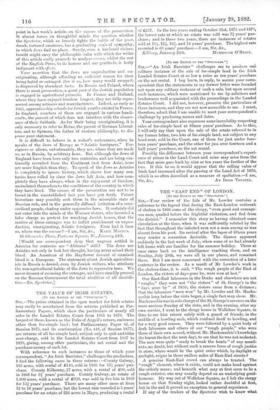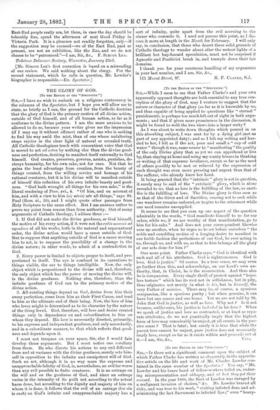THE "EAST END" OF LONDON.
[To THE EDITOR OF THE "SPECTATOR."] Stu,—Your review of the Life of Mr. Lowder contains a reference to the legend that during the East-London outbreak of cholera in 1866 some of the clergy, "even good and courage- ous men, quailed before the frightful visitation, and tied from the district." I remember this story as having obtained some circulation at the time, when it was sufficiently refuted by the fact that throughout the infected area not a man among us-was absent from his post. Its revival after the lapse of fifteen years may render a correction desirable. The disease appeared suddenly in the last week of July, when some of us had already left home with our families for the summer holiday. Three at once came back on the intelligence reaching them, and on Sunday, July 29th, we were all in our places, and remained there. But I am more concerned with the correction of a later sentence in the review. As a result of Mr. Lowder's work in the cholera-time, it is said, "The rough people of the East of London, the rioters of days gone by, were won at last."
Our East-End labourers in the Docks and elsewhere are not "roughs," they were not "the rioters" of St. George's in the "days gone by" of 1859; the rioters came from a distance; that the labourers "were won" by Mr. Lowder and Mr. Macko- /mai° long before the riots began, a single fact may show. Mr. Mackonochie was in sole charge of the St. George's services on the most anxious Sunday of the riots, and in the evening, after my own service, I went to the clergy house in Wellclose Square, in time to see him return safely with a. guard of friends, in the middle of a howling mob, which confined itself to howling, and for a very good reason. They were followed by a quiet body of dock labourers and others of our "'rough people," who were there of their own accord, without Mr. Mackonochie's knowledge (he learnt the fact the next day), to see that he was not molested. The men were quite "ready to break the heads" of any assail- ants, no doubt, but without such a reserve force of rough justice in store, where would be the quiet order which, by daylight or gaslight, reigns in those endless miles of East-End streets ?
A genuine East-End crowd can always be trusted. The "rough" element, where it exists, could not make head against the orderly mass ; and beneath what may at first seem to be a rough exterior, one may usually depend on an underlying good- humour. My way out of Wellclose Square, as I left the clergy house on that Sunday night, looked rather doubtful at first, but in the end it proved no exception to general experience.
If any of the readers of the Spectator wish to know what
East-End people really are, let them, in case the day should be tolerably fine, spend. the afternoon of next Good Friday in Victoria Park. It is a pleasure not readily forgotten, only—if the suggestion may be excused—we of the East End, past or present, are not an exhibition, like the Zoo, and we do not choose to be " patronised."—I am, Sir, &c., F. Salcox LEA.
Tedstone Delamere Rectory, Worcester, January 23rd.
[Mr. Simcox Lea's first correction is based on a misreading of our review. We said nothing about the clergy. For the second statement, which he calls in question, Mr. Lowder's biographer is responsible.—En. Spectator.]







































 Previous page
Previous page